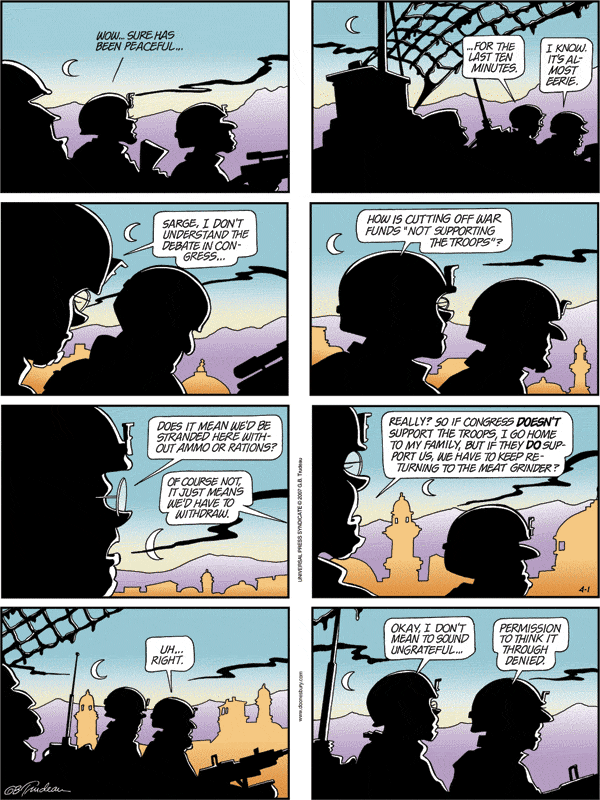Posted on February 5, 2008 in
00 and
00 and
00 and
00 and
00 and
00 and
00 Dr. Lawrence Britt, a political scientist, wrote an article about fascism which appeared in Free Inquiry magazine, a journal of humanist thought. Dr. Britt studied the fascist regimes of Hitler (Germany), Mussolini (Italy), Franco (Spain), Suharto (Indonesia), and Pinochet (Chile) and found that the regimes had 14 things in common.
The 14 characteristics are:
1.. Powerful and Continuing Nationalism – Fascist regimes tend to make constant use of patriotic mottos, slogans, symbols, songs, and other paraphernalia. Flags are seen everywhere, as are flag symbols on clothing and in public displays.
2.. Disdain for the Recognition of Human Rights – Because of fear of enemies and the need for security, the people in fascist regimes are persuaded that human rights can be ignored in certain cases because of “need.” The people tend to ‘look the other way’ of even approve of torture, summary executions, assassinations, long incarcerations of prisoners, etc.
3.. Identification of Enemies/Scapegoats as a Unifying Cause – The people are rallied into a unifying patriotic frenzy over the need to eliminate a perceived common threat or foe; racial, ethnic or religious minorities; liberals; communists; socialists; terrorists, etc.
4.. Supremacy of the Military – Even when there are widespread domestic problems, the military is given a disproportionate amount of government funding, and the domestic agenda is neglected. Soldiers and military service are glamorized.
5.. Rampant Sexism – The government if fascist nations tend to be almost exclusively male-dominated. Under fascist regimes, traditional gender roles are made more rigid. Opposition to abortion is high, as is homophobia and anti-gay legislation and national policy.
6.. Controlled Mass Media – Sometimes the media is directly controlled by the government, but in other cases, the media is indirectly controlled by government regulation, or through sympathetic media spokespeople and executives. Censorship, especially in wartime, is very common.
7.. Obsession with National Security – Fear is used as a motivation tool by the government over the masses.
8.. Religion and Government are Intertwined – Governments in fascist nations tend to use the most common religion in the nation as a tool to manipulate public opinion. Religious rhetoric and terminology is common from government leaders, even when the major tenets of the religion are diametrically opposed to the government’s policies or actions.
9.. Corporate Power is Protected – The industrial and business aristocracy of a fascist nation often are the ones who put the government leaders in power, creating a mutually beneficial business/government relationship and power elite.
10.. Labor Power is Suppressed – Because the organizing power of labor is the only real threat to a fascist government, labor unions are either eliminated entirely or are severely suppressed.
11.. Disdain for Intellectuals and the Arts – Fascist nations tend to promote and tolerate open hostility to higher education, and academia. It is not uncommon for professors and other academics to be censored or even arrested. Free expression in the arts is openly attacked, and governments often refuse to fund the arts.
12.. Obsession with Crime and Punishment – Under fascist regimes, the police are given almost limitless power to enforce laws. The people are often willing to overlook police abuses, and even forego civil liberties, in the name of patriotism. There is often a national police force with virtually unlimited power in fascist nations.
13.. Rampant Cronyism and Corruption – Fascist regimes almost always are governed by groups of friends and associates who appoint each other to government positions, and who use governmental power and authority to protect their friends from accountability.
14.. Fraudulent Elections – Sometimes elections in fascist nations are a complete sham. Other times elections are manipulated by smear campaigns against (or even the assassination of) the opposition candidates, the use of legislation to control voting numbers or political district boundaries, and the manipulation of the media. Fascist nations also typically use their judiciaries to manipulate or control elections.
















